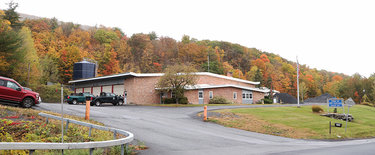New Scotland Town Board adopts $9.23M budget, looks for new planning members
NEW SCOTLAND — At $9.23 million, New Scotland’s budget for next year is up 6.6 percent over this year’s adopted spending plan.
The town board unanimously adopted the budget at its Nov. 9 meeting, where it also discussed the need for new planning board members due to the impending resignation of Christine Galvin and previous departure of board alternate Robert Davies.
The town-wide property tax rate is due to drop slightly next year, but in round numbers it will be $1.50 per $1,000 of assessed value for all New Scotland property owners.
Next year’s budget, which is largely unchanged from what the town presented in early October, includes a 5-percent cost-of-living pay increase for employees.
The salaries for the town’s full-time elected officials are increasing in 2023, from about $67,500 to $70,800 for supervisor; about $62,500 to $65,700 for town clerk; and approximately $79,400 to $83,4000 for highway superintendent.
In part-time posts, salaries for the town’s two judges would each increase from about $30,200 to $31,700, while each of the four town board members would earn about $11,000, a $500 increase over this year.
But one town worker came to the Nov. 9 public hearing for the budget to accuse the town board of “reneging on your employees” and “reneging on your promises to your employees.”
Highway department worker Kevin Schenmeyer, who’s been employed by the town for 34 years, asked the board why a “previous years’ relationship as far as” salary step levels “is being thrown out the window this year?”
Schenmeyer said, after over three decades of employment, he’s still on step six of seven on the town’s salary scale. “And what I was told last year [was] that I would be going to step seven this upcoming budget year,” to which Schenmeyer said he was agreeable, “Now all of a sudden, that’s vaporized,” he told the board.
Schenmeyer said there are other employees in similar situations. “We’d like to know why,” he said.
Supervisor Douglas LaGrange told Schenmeyer he could offer only his opinion on the matter, adding that the new salary-scale structure was created last year.
The concern for the 2023 budget, LaGrange said, was an across-the-board 5-percent cost-of-living pay increase for employees, “and then when we get to the next stages, maybe next year or what have you,” the town would place employees with 12 or more years of service into the newly-created seventh step on the payscale.
Schenmeyer then took the board to task for town employees’ comparatively low pay and said it was the cause of high worker turnover.
For a number of years, Schenmeyer said, “There hasn’t really been a lot of serious concern for the guys on the hill, otherwise known as the highway department.”
He said he understood why highway Superintendent Ken Guyer was having difficulty finding help. “People are basically looking elsewhere, going from the town of Scotland, to the town of Rensselaerville, to the town of Westerlo,”he said. “And actually making more money and better benefits, and we’re stuck.”
LaGrange looked to push back on some of Schenmeyer’s assertions, noting that workers received annual cost-of-living pay increases.
“I’m very proud of what we’ve done in the past few years with the highway department,” said LaGrange. “And, if for some reason people feel otherwise, you know, there’s not much I can do about it.”
To pay for next year’s budget increase without the corresponding tax bump, the town will tap its $5.3 million fund-balance reserve for about $495,000.
“We have very healthy funds,” LaGrange said on Nov. 9. “I’ve said over and over and over, that the boards I’ve been involved with have been very careful in budgeting and we’ve done a good job to have healthy fund balances.”
Galvin
“It’s just time for me to make a change,” Galvin said of her reason for stepping down from the planning board, adding she’s currently busy with her volunteer immigration work, representing undocumented immigrant children for The Legal Project in Albany.
Her last meeting will be in December.
The Legal Project was created by the Capital District Women’s Bar Association and provides services to people who can’t afford the usual costs of engaging an attorney, Galvin said; the not-for-profit organization offers help in a number of fields, including foreclosure, domestic violence, bankruptcy, and immigration, which is Galvin’s area of expertise.
She told The Enterprise that she’s represented over 70 children, and has a current caseload of over 50 children under the age of 21. She recently received the Champion Award, which is the highest award given to pro bono attorneys who donate their time to The Legal Project.
Galvin was on the planning board for a little over five-and-a-half years, she said. But it wasn’t just her time on the planning board that she considered as her service to the town. She pointed to her time with New Scotlanders 4 Sound Economic Development, the group that formed in opposition to a proposed Target-anchored mall on the site of the former Bender melon farm; her time chairing the comprehensive plan update committee; and her work on the recent update to the New Scotland Hamlet law.
While all planning board members offer their opinions and ask questions of applicants, none save for the chair did so as frequently or ardently as Galvin, who spent seven years as the chair of the planning board of the town of Wright in Schoharie County.
“The thing is, I come from a litigation, trial-lawyer background,” Galvin said. “So it’s very natural for me to analyze situations and advocate for my position.”
Asked about the board losing her independent voice, Galvin downplayed the question and said it was an opportunity for the town board to find a really good candidate to replace her.
As for what she was most proud of from her time on the board, Galvin couldn’t really say, just that she had been “dedicated to doing what was best for the town,” and ensuring that the projects the board approved were in accordance with the law and a benefit to the town.



